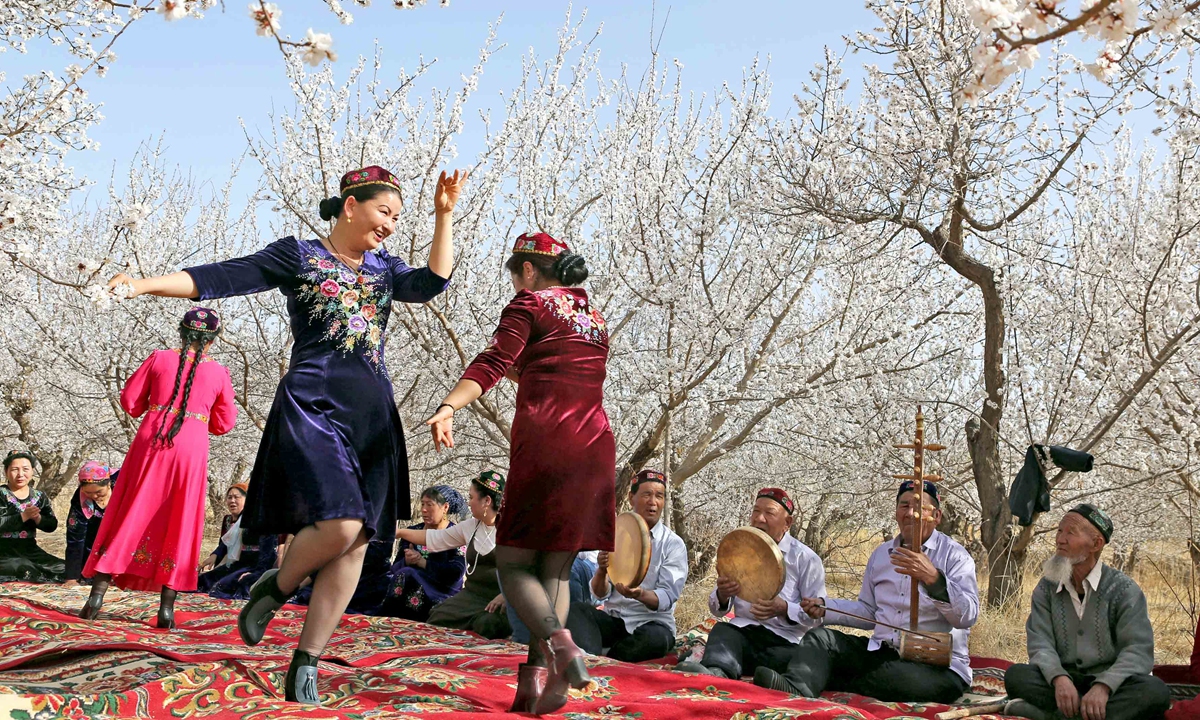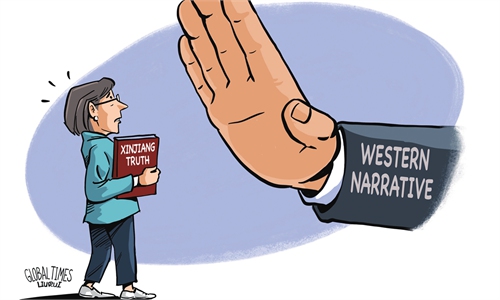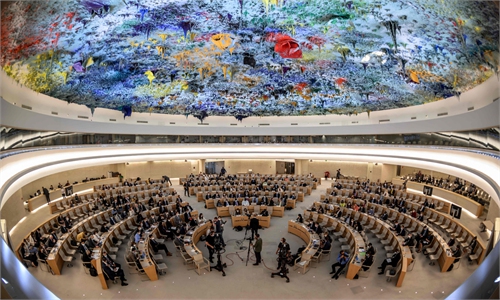
People are holding a Meshrep, a traditional Uygur community gathering, in Hami city of Xinjiang. Photo: IC
Unsurprisingly, some self-claimed “human rights defenders,” including the United States and Britain, leapt at the chance of the recent 52nd Regular Session of the Human Rights Council and spout their “concerns” for human rights situation in China's Xinjiang.Over the past few years, they have repeated the sensational Xinjiang “genocide” rhetoric numerous times, while China, in response, has refuted those smears with solid numbers and facts about Xinjiang’s notable development.
As an ordinary citizen with an empty wallet, should I be more concerned about whether I can lead my life as comfortably as possible within my limited budget than to stop the smears against the place of origin of cottons for my clothes. Why should I care about Xinjiang at all?
Here are my answers.
First of all, it’s about truth. In an age where the truth is drowned in misinformation, some countries have become increasingly adept at confusing and manipulating the public with disinformation and lies. For example, bombshells like Occupy Wall Street in 2011, the Ohio train derailment this February and Pulitzer Prize-winning journalist Seymour Hersh's identification of US blowing up the Nord Stream pipeline have been deliberately ignored by the West.
As for the case of Xinjiang, the region witnessed its economy grow 160 times over the past 60 years, and its Uygur population expanded from 2.2 million to about 12 million. Despite these facts, some Western countries still concoct and spread disinformation about Xinjiang. Such deed is not only disrespectful to the local people, but is also a falsification of truth and a stain on the collective historical memory of human civilization.
Imagine that thousands of years ago, ancient sages spent their entire lives searching for the truth, while us, standing on the shoulders of giants, allow our eyes to be blinded by deception and end up being prisoners in information cocoons trapped and manipulated by the Matrix. This is not the direction in which humanity should be headed.
Second, it’s about rejecting the monopoly of the definition of human rights. For quite a long time, developed countries have made arbitrary judgments about the human rights situation in developing countries, as if they have the ultimate say on human rights. In their eyes, despite endless gun violence, drug abuse, and abuse of force in the United States and the continuous deterioration of racism and the record-high rate of hate crimes in the United Kingdom, these countries are still touted as the paragon of "respecting human rights". By contrast, developing countries, no matter what they did or did not do, are “human rights violators” as long as they are not welcomed by the West.
On the issue of Muslims, Western countries, harboring Sinophobia, disdain Muslims in the Middle East, Europe and Africa, but see Muslims in Xinjiang through a filtered lens. According to US Radio Talkshow host Garland Nixon’s tweet, President Biden has admitted that, “let's face it, no one in their right mind is gonna believe that we give a crap about Muslims.” How can these countries, who harangue but care little about human rights, be allowed to hold the power to define this sacred concept? Breaking their monopoly is not an easy task, but it is a necessary one and requires the efforts of all countries.
Third, it’s about the non-politicization of human rights. Human rights are frequently used as a fig leaf by the Western countries for intervention in other countries. For example, Sheila Carey, consul at the US Consulate General in Guangzhou, and her colleague Andrew Chira, told guests at a cocktail reception in 2021 that the US government is “very clear that nothing is wrong about Xinjiang, but to hype forced labor, genocide and to attack their human rights policies through the Xinjiang issue are an effective means to ... get the Chinese government bogged down”. Due to sanctions implemented by the West in the name of human rights, businesses in Xinjiang may face a tough time, and local people, who have just been lifted out of poverty, may lose their jobs and fall back into misery, and a host of social problems will follow along the way.
At the High-level Segment of the Regular Session of the Human Rights Council, many dignitaries from the developing world pointed out that, some countries’ attempts to politicize human rights constitute interference in the internal affairs of independent and sovereign countries, especially developing ones. These developed countries are doing this to the world's largest developing country, let alone to those smaller, less developed ones. It should not be forgotten that the West’s bombings in the Middle East and sanctions against Cuba and Venezuela under the pretext of human rights have led to displacement, starvation and tremendous loss of life.
To ignore liars and bullies is to connive. The issue of Xinjiang is not a war of words, but about the fundamental principles of being human, about fairness and justice, and about the unfettered development of a country. That’s why I say that every nation has a responsibility to stop the lies about Xinjiang.
The author is a commentator on international affairs, writing regularly for Global Times, China Daily, etc. He can be reached at xinping604@gmail.com.


